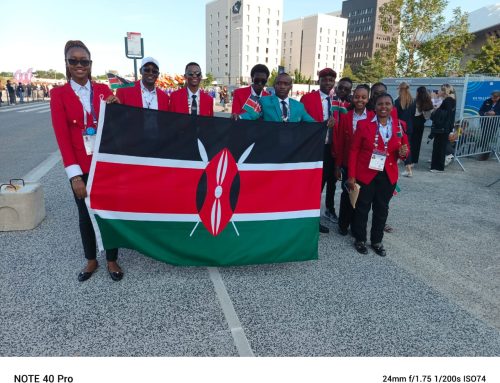 The Director General of Technical and Vocational Education and Training Authority (TVETA) Dr Kipkirui Langat has said that the government has set in place strategies to ensure that all unemployed youth out of school have relevant skills that will prepare them for either the labour market, entrepreneurship of self-employment.
The Director General of Technical and Vocational Education and Training Authority (TVETA) Dr Kipkirui Langat has said that the government has set in place strategies to ensure that all unemployed youth out of school have relevant skills that will prepare them for either the labour market, entrepreneurship of self-employment.
Speaking during the Generation Kenya graduation ceremony held on Friday 15th March 2019 at the KICC, the DG said that the Ministry of Education is currently working closely with the Ministry of Labour to determine the all the occupational skills required in the country now and in the future to inform the kind of training relevant for the youths in each sector.
Generation Kenya is a public-private program, supported by the U.S. government through its development agency, USAID, and in collaboration with McKinsey & Company, Swedish International Development Agency (SIDA) and Safaricom Foundation. USAID Mission Director Mark Meassick and Generation Kenya CEO Ramakrishnan Hariharan presided over the graduation ceremonies.
“Every year there are about 1 million youths out of school without any formal training. This include over 500,000 who exit after completing Form Four and on average around 400,000 who do not transit to secondary after sitting Class Eight exams, although this year the number was reduced after transition to secondary increased to an average 87 per cent nationally.”
“This is a huge number and we have to interface both the formal training in TVET institutions and other intensive training programmes like what Generation Kenya are doing and others… that is to take the youth for training without looking at their education background and then give them soft skills and some technical skills required in the several sectors of the economy,” Dr Langat who was one of the invited guests said.
The TVETA DG said that the government is using the skills mapping and planning from the Ministry of Labour to address the short term and long term challenges the country is facing.
“The short-term is what we do with the youths out there not engaged and we find ways of engaging them to make them productive. In the long term the government focused in coming up with viable ways of produce the required labour for the local market, the region and the rest of the world,” he said.
During the graduation, over 4,000 Kenyan youth graduated with new skills to help them find and keep employment in high growth sectors and secure a prosperous future for themselves.
The Generation Kenya program works closely with the government of Kenya and technical based institutions such as Technical and Vocational Education and Trainings (TVETs) to equip youth with technical and employability skills. Since 2015, Generation Kenya has placed 84 per cent of the 13,000 graduates into meaningful employment through a network of more than 350 employer partners across Kenya.
The youth attend 4-8-weeks of boot camp training in banking, financial sales, sewing machine operation, restaurant services, retail, and consumer goods distribution.
“The U.S. government investments in youth are vital to our mission of promoting self-reliance and resilience among our partner countries, as well as to the goals of worldwide stability and prosperity that we all share,” said USAID Mission Director Mark Meassick.
The graduation ceremony was held at the KICC and presided by Hon. Peter Munya, the Cabinet Secretary for Cabinet Secretary for Ministry of Industry, Trade and Cooperatives.
“Programs such as Generation Kenya will help boost SMEs by providing the necessary skill set. SMEs are the biggest employers for the youth. The Government is working hard to continue to create the right environment to nurture such talents.”, Hon. Munya said.
Generation Kenya has grown from one training location in Nairobi in 2015 to 33 across 20 counties. The new graduates join a growing alumni network of 13,000 talented workers contributing to the growth of the Kenya’s economy. Of the 13,000 graduates, 57% are female. And, 70% attained a Grade C or below in the Kenya Secondary School Certificate of Education (KCSE), examination — a population whose transition rate from secondary school to tertiary institutions is low.
“The debate has always been whether the graduates coming from both the technical and institutions of higher learning are half-baked or if they meet the necessary threshold to be employable. This is exactly why Generation was established, to try and address the existing challenge of entry level skilled labour across different industries,” Generation Kenya CEO Ramakrishnan Hariharan.


